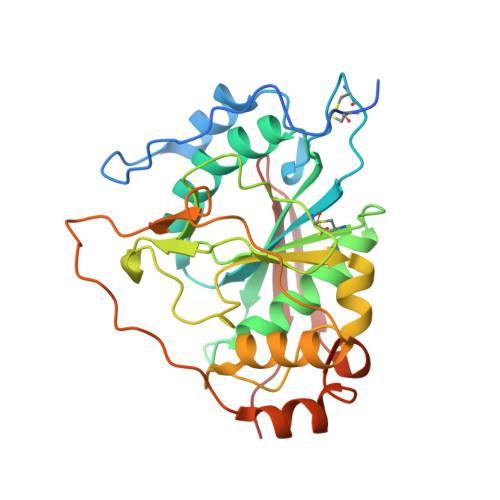Crystal structures of the bovine beta4galactosyltransferase catalytic domain and its complex with uridine diphosphogalactose.
Gastinel, L.N., Cambillau, C., Bourne, Y.(1999) EMBO J 18: 3546-3557
- PubMed: 10393171
- DOI: https://doi.org/10.1093/emboj/18.13.3546
- Primary Citation of Related Structures:
1FGX, 1FR8 - PubMed Abstract:
beta1,4-galactosyltransferase T1 (beta4Gal-T1, EC 2.4.1.90/38), a Golgi resident membrane-bound enzyme, transfers galactose from uridine diphosphogalactose to the terminal beta-N-acetylglucosamine residues forming the poly-N-acetyllactosamine core structures present in glycoproteins and glycosphingolipids. In mammals, beta4Gal-T1 binds to alpha-lactalbumin, a protein that is structurally homologous to lyzozyme, to produce lactose. beta4Gal-T1 is a member of a large family of homologous beta4galactosyltransferases that use different types of glycoproteins and glycolipids as substrates. Here we solved and refined the crystal structures of recombinant bovine beta4Gal-T1 to 2.4 A resolution in the presence and absence of the substrate uridine diphosphogalactose. The crystal structure of the bovine substrate-free beta4Gal-T1 catalytic domain showed a new fold consisting of a single conical domain with a large open pocket at its base. In the substrate-bound complex, the pocket encompassed residues interacting with uridine diphosphogalactose. The structure of the complex contained clear regions of electron density for the uridine diphosphate portion of the substrate, where its beta-phosphate group was stabilized by hydrogen-bonding contacts with conserved residues including the Asp252ValAsp254 motif. These results help the interpretation of engineered beta4Gal-T1 point mutations. They suggest a mechanism possibly involved in galactose transfer and enable identification of the critical amino acids involved in alpha-lactalbumin interactions.
- Architecture et Fonction des Macromolécules Biologiques (AFMB), CNRS, UPR 9039, 31 Chemin Joseph Aiguier 13402 Marseille Cedex 20, France. gastinel@afmb.cnrs-mrs.fr
Organizational Affiliation:

















